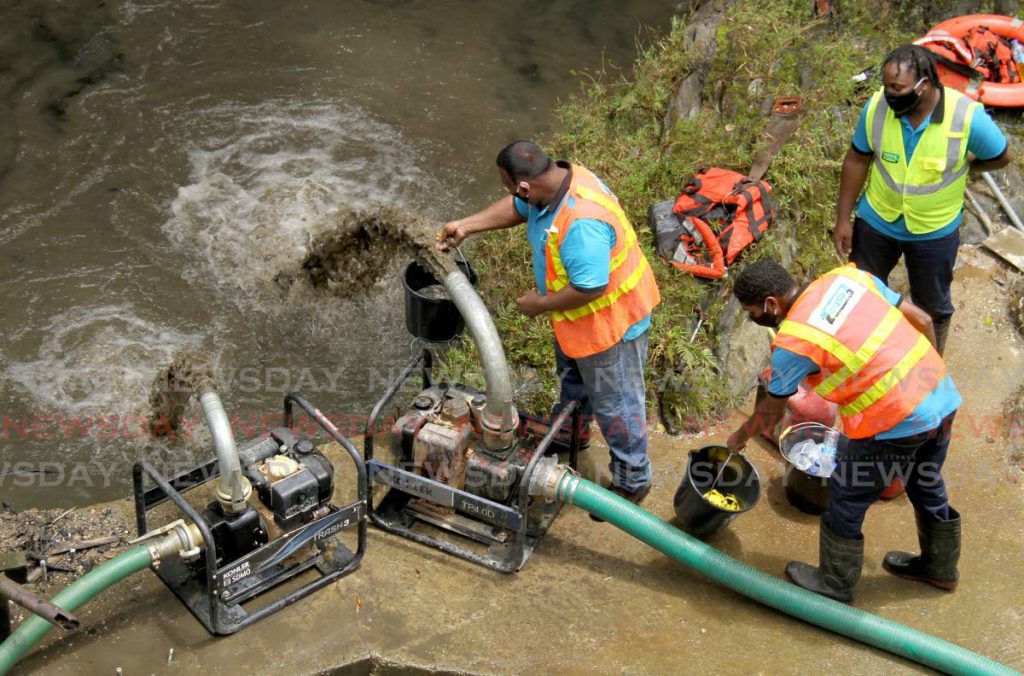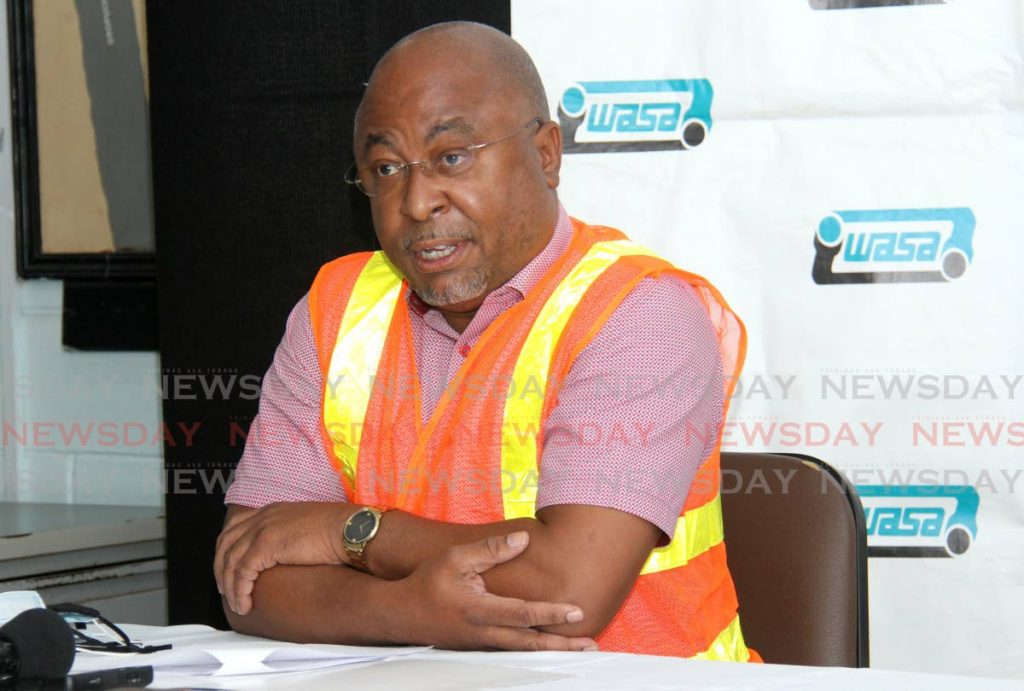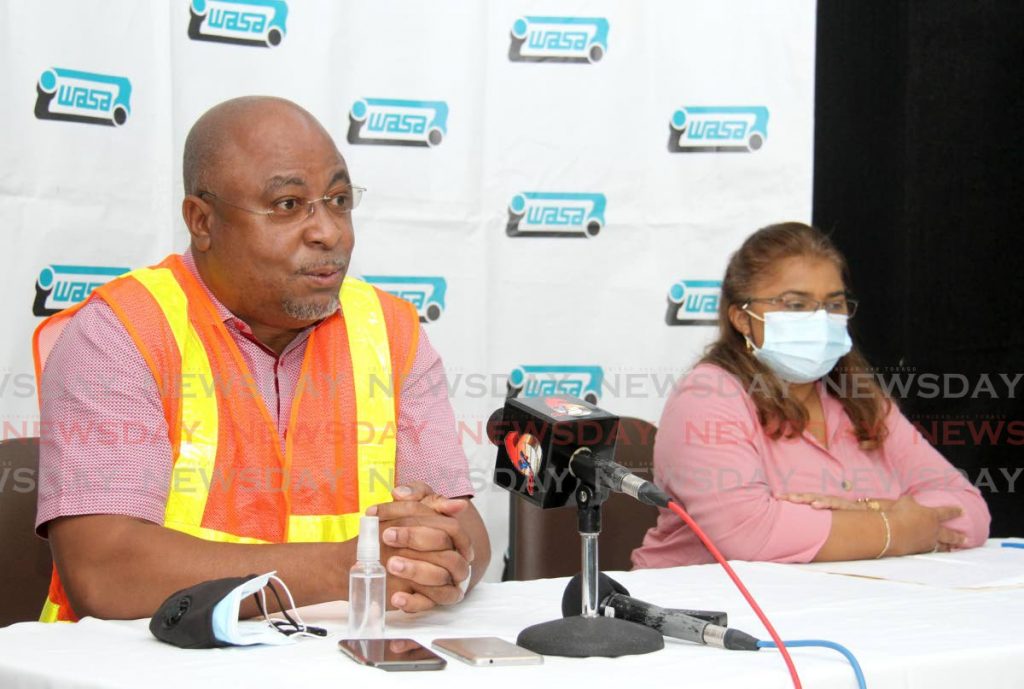WASA to fix 'lifetime' woes

A RELIABLE supply of water countrywide is at the mercy of the weather and pipeline and mechanical infrastructure aged "beyond the prescribed lifetime," the Water and Sewerage Authority's (WASA) leadership has admitted.
Sherland Shappard, who was appointed as acting CEO of the state utility following Dr Lennox Sealy's resignation in July, hosted a media conference on Saturday to address, among other things, WASA's recent "challenges with maintaining a reliable water supply to several communities."
Sheppard said a public update on the country's present water supply was warranted "in view of some of the recent public statements regarding the water supply to various areas."
The situation, however, isn't straightforward, he suggested, noting several factors, including extreme weather which dictates the country's water supply.
Several parts of the country experienced particularly limited supplies of water during the dry seasons in 2019 and 2020.
Fortunately, Sheppard pointed out, WASA's four main impounding reservoirs, Arena, Navet, Hollis and Hillsborough were able to recover from an average capacity of 20 to 95 per cent between June and December 2020.
"Thankfully, the 2021 dry season was not a repeat of the previous two," he said, adding that by June the reservoirs were at an average capacity of 90 per cent.
All reservoirs are at currently full capacity.
He said there are other key factors that impact WASA's ability to deliver a day-to-day service.
For instance, Sheppard said, "Regrettably, over the past few weeks there has been an abnormal convergence of major operational issues, which has negatively impacted the service to a number of communities."
Additionally, "much of the pipeline and mechanical infrastructure are aged and in many cases beyond the prescribed lifetime.

"As such, the frequency of failures requiring the need for maintenance increases over time."
However, citing the national water stabilisation and improvement and community water investment programmes, funded by the Ministry of Public Utilities, Sheppard said the authority has already begun several water infrastructure development projects.
"I want to assure you that the authority is up to the task at hand," he said.
The projects are centred around rehabilitation and development of wells, booster development, and pipeline installation.
Sheppard said the projects involve the development and rehabilitation of wells to deliver additional water into WASA's distribution system in areas such as Mayaro, Freeport, Las Lomas, Sangre Grande and Tamana.
Development and upgrade of booster stations are currently taking place in Pitch Road, Morvant, Mendez Drive, Champ Fleurs, Tamana and Brazil, and that installation of new distribution pipelines will take place in Penal, Tabaquite, La Romain, Barrackpore, Maraval, Toco, Canaan and Concordia in Tobago, and other areas.
"It is important to note that if we all adopt the Integrated Water Resource Management approach to the nations water resources, we will recognise that ensuring a reliable supply of water to all communities across TT is the responsibility of all of us collectively," Sheppard said.
"If this is done, there will be proper control over some of the activities taking place in our watersheds that impact our rivers and water quality."
The effort to supply water nationwide, he stressed, is a collaborative one. The public needs to play its part by paying its dues as he noted a debt of over $900 million owed by just private and commercial property owners alone.
"The projects being undertaken by the authority, with the aim of improving its operations and service to customers costs considerable sums of money.
"Therefore, customers will recognise the link between paying their bills and the viability of the authority’s operations, in order to continue providing a service.
"There is much work to be done to improve and expand the service provided by the authority, which requires significant investment. Our customers paying their rates, which by the way are amongst the lowest in the hemisphere, will go a long way in sustaining and improving the operations of the authority.
Meanwhile, Shaira Ali, acting director of operations at WASA, noted that the water supply is comprised of surface water from rivers, reservoirs and lakes, accounting for 60 per cent, along with ground water (wells) and desalinated water, accounting for 20 per cent each.
"It is important to point out that our largest water source...surface water, is also the most vulnerable, since it can be largely affected by the vagaries of our dry and wet seasons.
"In this regard, one of the issues...that has negatively impacted the service to various communities in recent week is some extreme weather conditions, which affected production at several surface water treatment plants located in the north east.
"It is important to note that excessive rainfall presents challenges to water production at some of our surface water treatment plants," Ali said.
"This is due to rivers becoming flooded and turbid...which renders those facilities inoperable, since the water cannot be properly treated."
Turbidity refers to amount of silt and similar debris in the water.

"I want to underscore at this time that much of the problems of turbidity affecting operations at our treatment plants is being caused by irregular activities taking place in the upper reaches of the watersheds."
These activities, Ali said, include quarrying, indiscriminate dumping and land clearing, among others.
"As such, whenever there is heavy and consistent rainfall, as was the case on several occasions in recent weeks, the operations at several of our plants in the north east are affected.
Those included the North Oropouche, Tompire, Matura, Aripo, Guanapo, Quare, Caura, Luengo and Naranjo, and Acono Water Treatment Plants.
"In fact," Ali said, "during the month of August, the operations at these plants were disrupted due to turbidity and flooded rivers on no fewer than five to six separate days."
Ali said mechanical problems affecting operations at some key facilities such as El Socorro Booster Station, which experienced disruptions twice, would have impacted areas in north west Trinidad from Morvant to Cocorite, while mechanical issues at the River Estate Pumping Station affected the service to parts of Diego Martin.
The South Oropouche Booster Station impacted the supply to large parts of the south west, while at the North Oropouche plant, a defective pump and silted intake have impacted production and ultimately the water supply to several communities in north east Trinidad.
Other issues highlighted included ruptures along major transmission pipelines, some of which were attributed to landslips, such as the 16-inch pipeline at Syne Village, Penal; a six-inch pipeline at Hindustan Road, New Grant; the 24-inch pipeline at Southern Main Road, Claxton Bay; and the 36-inch Navet Trunk Pipeline at Mango Road, Tabaquite.
"(These) issues have affected communities throughout the country, and have all occurred during the month of August alone, which is an unusually high occurrence of major disruptions over such a short period," Ali said.
"Many of these have been beyond our control. However, our maintenance teams have gone above and beyond the call, to ensure that the impact of these disruptions on our customers were kept to a minimum."

Comments
"WASA to fix ‘lifetime’ woes"